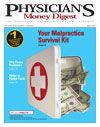Publication
Article
Physician's Money Digest
The Doctor Becomes the Patient
Author(s):
This special feature serves as a forum for our physician-readers to share their
stories. We welcome tales from your practice (eg, a unique patient, a staff crisis, etc),
your financial planning (eg, handling a windfall, surviving a scam, etc), your personal
life (eg, family stories, interesting hobbies, etc), and your adventures (eg, an exotic trip,
a personal discovery, etc). Please limit articles to 1000 words and share photos if possible.
Send submissions to Attn: Lisa A. Tomaszewski, Ascend Media Healthcare, 103
College Road East, Princeton, NJ 08540 or ltomaszewski@ascendmedia.com.
Many recent articles report that treatments for back pain are of little help—an assertion that diminishes hope for many chronic back sufferers. And medical experts say you can have pain and function, but how much discomfort and how much function? It makes you wonder how many of those medical experts experienced it themselves. As a neurologist, I cared for numerous patients with chronic back pain. But being a patient and suffering with my own lumbar pain made me a more empathetic doctor.
Most back pain gets better in a matter of weeks or months. Mine did not. The pain wore me out emotionally and physically. Seeing my afternoon patients felt like I was running the last mile of a marathon. Eventually the grinding and unrelenting lower spine discomfort I experienced influenced my decision to stop practicing medicine after 25 years.
Living a Nightmare
Stoicism was an unquestioned virtue in my German-Irish Catholic Midwest family. My mother set the example by never complaining or going to the doctor, so when my discomfort began, I ignored it. There was no preceding accident or instigating event—it wasn't clear to me or anyone else what the cause of my pain was. Eventually, an MRI showed a small, right, lower lumber herniated disc in an area that correlated with my pain. However, MRI abnormalities are common, even in the absence of back problems.
A bevy of medications, exercises, and epidural steroids didn't offer me relief. This prompted me to seek help at the Mayo Clinic in Rochester, Minnesota. My doctor was grim, and she verbally attacked me as though I voluntarily slipped my own disc. As a physician, she took advantage of her power to make me feel terrible. And I experienced the vulnerability of a patient, seeking the help of a physician for relief. I wondered if I had ever disregarded that vulnerability with any of my patients—and remembered a 40-year-old man who I made strip down to his boxer shorts for the examination. I could see that it embarrassed him terribly, but at the time, I ignored this. In retrospect, I would have taken that extra minute to have him put on a gown.
Finally, after 6 years of anguish, I had a lower lumbar discectomy, not knowing if it would help. The life I had known was potentially over if the surgery didn't improve my condition. My legs, shriveled from lack of exercise, missed the 4-mile walks I used to take three times a week. I was filled with concern over how I was going to avoid normal activities that caused me pain, like walking up stairs—a wheelchair and home elevator was a possibility in my future. Though my husband and daughter supported me completely, thoughts that death would be a better option than living in my present condition haunted me.
The Rocky Road to Recovery
The operation was, thankfully, an enormous success, and I was overwhelmed with gratitude toward Dr. Peter Hall, my neurosurgeon. Not only did we have a doctor-patient relationship, but we had also been colleagues and acquaintances, having worked together earlier in our careers at Wishard Memorial Hospital in Indianapolis and later on at St. Vincent's Hospital. But soon after my operation, Peter developed lung cancer and passed away, even though he had never smoked. He gave me back my life, but his was taken.
After surgery, I lived in a fog for weeks. It wasn't that I was on pain medications, but that I was simply struggling to accomplish life's little tasks while my body was repairing itself. And in the middle of what seemed to be an uphill battle, I lost my engagement ring, which held enormous sentimental value. The hill just seemed to get steeper, but I kept fighting to get back the life I knew I could have.
So, it may be true that the treatment for back pain is of little help. But for those who are among that statistic that improves and heals, they beat the odds—as a doctor I had seen it, and as a patient, I lived it. Suffering is not a good option. Neither is accepting immobilization. Taking action is often life-affirming in itself because it provides hope.
My backache journey was a rocky one. Now, I have more empathy plus appreciation of vulnerability. In the end, the decision to try one last treatment for my chronic back problem saved my life—the one worth living.






